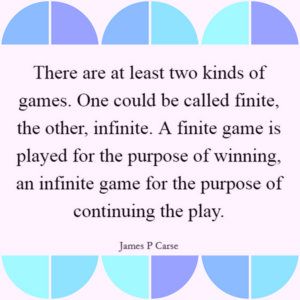 In this week’s issue of The Influential Counselor, my friend and school counselor hero Eric Domroes examined the games we play, in reference to James Carse and his book on Finite and Infinite Games. The distinction between these two types of games is crucial:
In this week’s issue of The Influential Counselor, my friend and school counselor hero Eric Domroes examined the games we play, in reference to James Carse and his book on Finite and Infinite Games. The distinction between these two types of games is crucial:
“A finite game is played for the purpose of winning, an infinite game for the purpose of continuing the play. Finite games are those instrumental activities – from sports to politics to wars – in which the participants obey rules, recognize boundaries and announce winners and losers. The infinite game – there is only one – includes any authentic interaction, from touching to culture, that changes rules, plays with boundaries and exists solely for the purpose of continuing the game. A finite player seeks power; the infinite one displays self-sufficient strength. Finite games are theatrical, necessitating an audience; infinite ones are dramatic, involving participants.”
While Eric addressed these games for counselors in terms of the finite and infinite aspects of college admissions and grading conventions, we can also apply this dichotomy to the noble work of helping students prepare for tests.
Obviously, any academic test is a finite game, one that we tutors like our students to win! But the contrived and circumscribed nature of certain tests–particularly the ones that serve as fateful rites of passage–embolden critics to dismiss them because of their rules and boundaries. “How often,” they scoff, “will you have one train leaving Rochester at 8:20am at 60 mph and another leaving Albany at 9:40 at 50 mph and have to calculate the time they meet? Useless!”
Putting aside the blatant benefits that winning certain finite games accrue to the infinite one, we can still pull the curtain aside and reveal–to students, parents, and anyone else willing to learn–the game within the game. Almost all admissions tests require mastery of fundamental reading, writing, quantitative, problem solving, and executive function skills. These skills change whatever game you choose to play, and facilitate success at every level.
As you teach and your students (hopefully) learn, consider what games you are playing. Clearly, students strive to win–or at least not lose too badly–in the finite game of school; can you help them see the infinite applications of what they are learning?
At the same time, look at your own games, both finite and infinite. Are you winning?
— Mike Bergin
Tutor Tips, Tools, and Thoughts
The Only Thing You Need to Get Good At
Restrict your attention to the things you can control, and don’t worry about the rest.
WWC | Find What Works!
The Institute of Education Sciences (IES) is the statistics, research, and evaluation arm of the U.S. Department of Education.
Maker’s Schedule, Manager’s Schedule
Or, in our world, Tutor’s Schedule, Developer’s Schedule
Magic for English Majors
Maybe we shouldn’t take an ax to humanities programs just yet.
The Power of a Compliment
Encouragement can enhance performance.
Did you enjoy this issue of Tutor: The Newsletter? Get the next issue right in your inbox by subscribing below:
